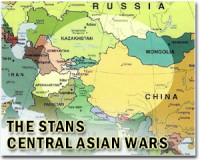| . |  |
. |
Kabul (AFP) Sept 2, 2010 US Defence Secretary Robert Gates on Thursday visited Afghanistan for military and government talks that highlighted tensions and disagreement between President Hamid Karzai and his top Western sponsor. The trip came a day after US combat operations ended in Iraq, shifting attention to America's war in Afghanistan, where troop deaths are at record highs and rampant corruption underscores the challenges facing the West. Karzai held a press conference with Gates and the head of international forces in Afghanistan, US General David Petraeus, and hit back at accusations he had undermined attempts to clamp down on corruption in the country. Blaming Western media, Karzai said: "The American public see the press they see and not the reality of Afghanistan. Corruption has to be fought correctly, not in violation of the rights of the people." The president has been criticised for intervening in a corruption case against the administrative head of the National Security Council, who was arrested in July but released on Karzai's orders after seven hours in prison. Mohammed Zia Salehi was arrested after Afghan police said a wiretap caught him soliciting a bribe in exchange for holding up a US probe into a company suspected of moving money for Afghan leaders, drug traffickers and insurgents. "I asked for his release for his arrest was illegally done, wrongfully done," said Karzai on Thursday. "The detention base and the investigative procedures were run by foreign elements, and there was serious concerns about human rights abuse... they were not respecting the Afghan laws," he told reporters. Gates sounded a more conciliatory tone, saying that he and Karzai agreed on the "principles" for the running of two Western-backed anti-corruption units. "We believe that the investigative rules of these units need to have credibility in the international community," he said. "President Karzai is the first to know more has to be done (on corruption)," added Petraeus, characterising his relationship with the Afghan leader as one with "candour". "We do not come at every issue from the same perspective but I think that's a reflection of the strength of the relationship," he said. The press conference was held hours after Karzai strongly condemned a NATO airstrike he said killed 10 civilians, but which the alliance force said hit only militants. Gates backed NATO's account Thursday. The issue of civilian casualties is sensitive as they are seen as greatly weakening support for the US counterinsurgency strategy among Afghans. Petraeus recently issued updated guidelines to troops that further insisted upon the avoidance of civilian injuries. On Sunday Karzai said Washington's war strategy needed a rethink, telling a visiting German politician that fighting the Taliban in Afghan villages "has been ineffective and is not achieving anything but killing civilians". The coalition has been responsible for a fifth of civilian casualties this year, with most of the rest of the 1,300 deaths caused by militants, according to UN figures. Last week, the Western-backed Karzai told American officials that Washington and its NATO allies must shift their military focus to insurgent hideouts on the Pakistani side of the border. In Iraq, Gates said Wednesday that America's war there is over but that the outcome would remain "clouded" by the reason it was waged in the first place. President Barack Obama late Tuesday officially announced the end of the US combat mission in Iraq, where US forces are now down to around 49,700, for an advisory and training mission, with the last forces to leave in 2011. As Obama drew a veil over the seven-year conflict in Iraq, the annual death toll of American soldiers in Afghanistan reached its highest point since the war began almost nine years ago. With momentum there increasingly seen to have turned in the Taliban's favour, Obama appeared to step back from an earlier pledge that US forces would begin withdrawing from Afghanistan in July 2011. "The pace of our troop reductions will be determined by conditions on the ground, and our support for Afghanistan will endure," Obama said in an address to the nation Tuesday. "But make no mistake, this transition will begin, because open-ended war serves neither our interests nor the Afghan people's." His words echoed those of Petraeus, who told AFP in Kabul on Tuesday that the withdrawal would be gradual, starting in small secure areas. The United States and NATO are building up their troop numbers in Afghanistan to almost 150,000, with Obama's surge of an additional 30,000 soldiers almost complete, Petraeus said.
Share This Article With Planet Earth
Related Links News From Across The Stans
 US sorry over 'mistreatment' of Pakistan military delegation
US sorry over 'mistreatment' of Pakistan military delegationIslamabad (AFP) Sept 3, 2010 The United States has apologised to Pakistan over "mistreatment" of a Pakistani military delegation at a US airport this week, the Pakistani defence ministry said Friday. US undersecretary of state for defence Michelle Flournoy apologised during a telephone call to Pakistan's top defence ministry official, Syed Athar Ali, the ministry said in a statement. Flournoy "apologised for the mis ... read more |
|
| The content herein, unless otherwise known to be public domain, are Copyright 1995-2010 - SpaceDaily. AFP and UPI Wire Stories are copyright Agence France-Presse and United Press International. ESA Portal Reports are copyright European Space Agency. All NASA sourced material is public domain. Additional copyrights may apply in whole or part to other bona fide parties. Advertising does not imply endorsement,agreement or approval of any opinions, statements or information provided by SpaceDaily on any Web page published or hosted by SpaceDaily. Privacy Statement |